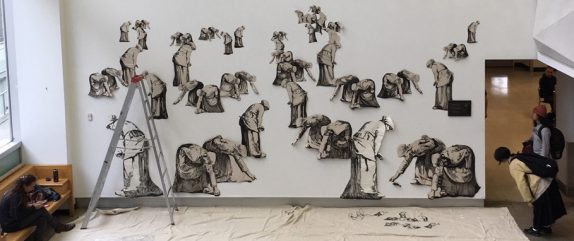Announced in the Ontario Budget , the Ford government’s reckless new market-based approach to funding postsecondary education will fundamentally compromise the integrity of Ontario’s higher education system. This alarming shift in education funding will create greater inequity, hurt students, and threaten the quality of education in our province.
The proposed market-based performance funding model will tie 60 per cent (over $3 billion dollars) of postsecondary funding to each institution’s “performance” against a set of arbitrary and flawed metrics. This dramatic shift follows years of stagnant public funding for postsecondary education in Ontario, and is only the latest in a series of attacks on the foundations of postsecondary education in the province, including cuts of over $400 million to college and university budgets, cuts of almost $700 million to student financial assistance, and cuts to the democratically determined student fees that allow students’ unions to advocate on behalf of, and provide vital support to their members.
Universities and colleges are unique spaces created to facilitate advanced education and research. They are publicly funded because they produce a vital public good: new knowledge and understanding of the natural and social world.
Postsecondary education is an essential extension of Ontario’s exceptional public education system, which is founded on a holistic approach to developing the human mind; it provides a far greater benefit than simply training students for the workforce. The province’s longstanding commitment to advanced education and research has fostered generations of curious, critical, and creative citizens, while consistently producing innovative and ground-breaking research and solutions to society’s most pressing problems.
Unfortunately, the narrow-minded Ford government does not seem to understand the purpose of postsecondary institutions. They believe colleges and universities exist solely to produce workers and intellectual property for profit-driven corporations.
Without any consultation with sector stakeholders, this government is ignoring sound public policy and imposing its own reckless ideological framework on Ontario’s postsecondary education system. The results will be devastating.
By design, performance funding rewards institutions that meet specific targets while penalizing those that do not. In doing so, it denies vital funding to the institutions that need it most to improve their educational outcomes. In effect, rather than encouraging institutions to improve in areas where they are not meeting targets, this approach will ensure institutions fall further behind.
This reckless approach to funding provides only the illusion of accountability, but is a very real threat to equity, accessibility, and the quality of postsecondary education. It will work against quality improvement and punish students studying at institutions that have already had their budgets reduced by the Ford government. And it will do nothing to improve accountability, as Ontario’s universities and colleges already have comprehensive structures in place to evaluate the effectiveness of the programs they offer.
A wide body of research shows that performance funding is incapable of credibly reflecting the breadth and depth of a student’s education, the long-term benefits of basic research projects, or the contributions of a faculty or staff member. Instead, research shows that this funding model is far more likely to have negative consequences – slowly but certainly eroding the integrity of Ontario’s postsecondary education system.
Examining evidence from numerous studies in other jurisdictions where this funding approach has been introduced, the dangers are clear that performance funding is likely to:
- exacerbate inequities between postsecondary institutions and disadvantage northern and smaller universities and colleges;
- incentivize the hiring of more precariously employed contract faculty and staff, as financial uncertainty for postsecondary institutions makes long-term planning more difficult;
- hinder access to higher education for marginalized students, as admission requirements are skewed to ensure only those students who postsecondary institutions consider to have the best chance of graduating are admitted;
- lead to shorter certificate programs with less quality control, decreases in degree attainment, and lower graduation requirements, all as part of efforts to boost student retention and graduation rates;
- accelerate the corporatization of colleges and universities, as they are encouraged to look for more private funding;
- incentivize more administration and bureaucracy to track metrics and identify ways to manipulate internal processes to meet the criteria needed to secure more funding;
- fail to improve the labour market outcomes this government seems so obsessed with, as institutions focused on the labour market of today will graduate students years after those workers are supposedly needed; and
- compromise institutional autonomy, education quality, and research outcomes by increasing government influence over which courses are taught and which research receives funding.
It is universally understood that an effective postsecondary education system requires universities and colleges to be kept at arm’s length from government and partisan political agendas. By imposing their ideological fantasies on postsecondary education, the Ford government will disrupt the basic knowledge creation process in the academy, limit the capacity of students and researchers to innovate, and stall one of the vital economic engines for this province and its communities.
Rather than engaging in risky and destabilizing changes to Ontario’s postsecondary education funding formula, the government should instead put students first and invest in the province’s colleges and universities. Evidence shows that, even in the absence of explicit performance goals or financial incentives, completion rates increase when institutions receive additional resources. Unfortunately, Ontario continues to rank last in Canada in per-student funding.
Adequate, stable public funding for postsecondary education will help students by ensuring better academic support services, sustainable faculty-to-student ratios, and lower tuition fees – all of which are effective ways to increase degree attainment. Publicly funded postsecondary institutions also support good jobs on campus by providing institutions with resources to invest in faculty renewal and hire precariously employed contract faculty and staff into secure full-time positions.
Higher education should foster creative, curious, and critical minds. It should provide students with the support, opportunity, and inspiration to push forward in the quest for knowledge and understanding. Performance-based funding measures undermine these values and the very purpose of postsecondary institutions.
Ontario’s university and college students, faculty, and staff are committed to working side-by-side to resist the Ford government’s reckless attacks on our postsecondary education system. Together, we will continue our efforts to cultivate a high-quality, equitable education system that fosters young minds, innovative research, and good jobs. We call on the government and MPPs of all political stripes to reject this reckless and dangerous new funding model and, instead, to invest in Ontario’s postsecondary education system so that it can thrive.
Signed,
Felipe Nagata, Chairperson, Canadian Federation of Students–Ontario
Janice Folk-Dawson, Chair, CUPE Ontario University Sector
Rahul Sapra, President, Ontario Confederation of University Faculty Associations
Chris Buckley, President, Ontario Federation of Labour
RM Kennedy, Chair, OPSEU College Faculty
Janice Hagan, Chair, OPSEU College Support Staff
Kella Loschiavo, Chair, OPSEU University Sector 9
Harvey Bischof, President, Ontario Secondary School Teachers’ Federation
Sharon DeSousa, Regional Executive Vice-President, PSAC Ontario
Marty Warren, Director, United Steelworkers–District 6
Naureen Rizvi, Ontario Director, Unifor
For media inquiries, contact:
Ben Lewis, Communications Lead
Ontario Confederation of University Faculty Associations
communications@ocufa.on.ca | 416-306-6033
Download this statement in English.
Téléchargez la déclaration en français.









